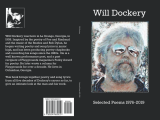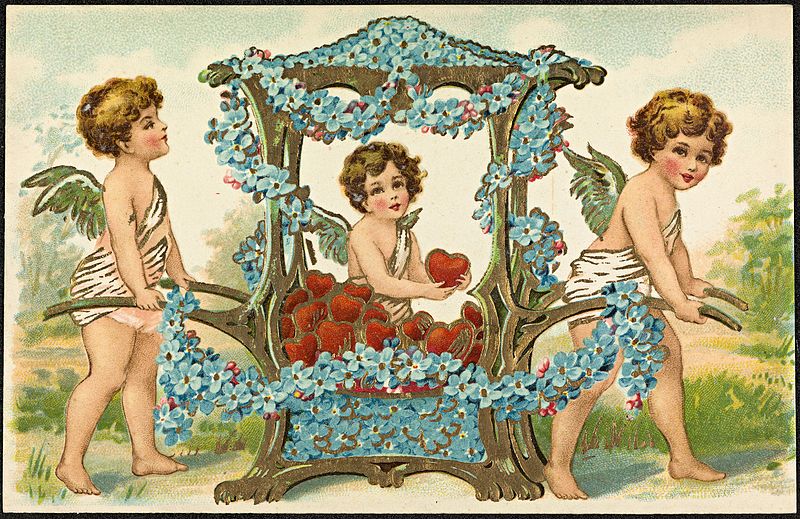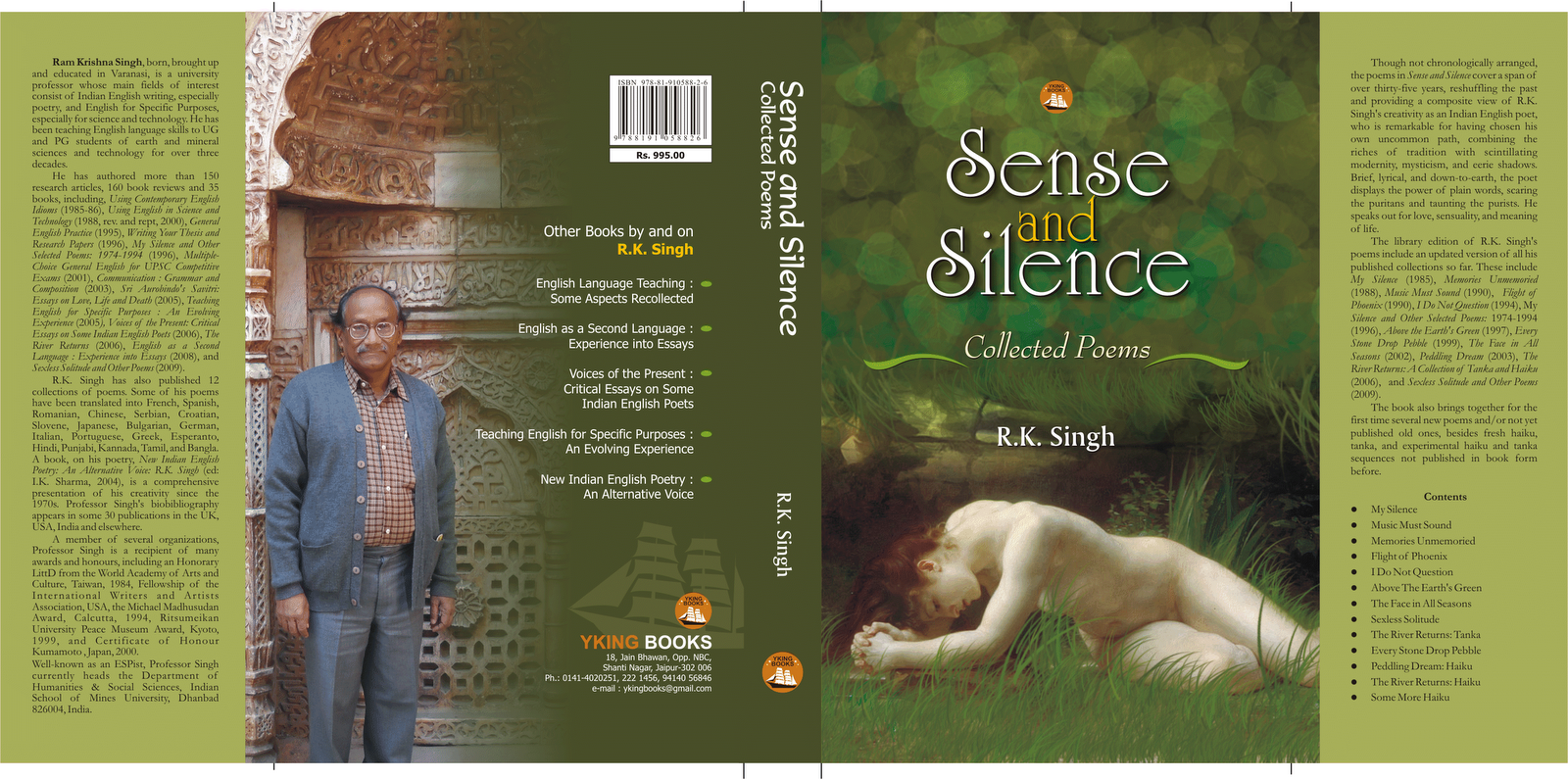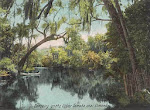Sunday, August 28, 2022
August / Rebecca Hey
August
Oh! for the covert of some gelid cave,
Whose dank walls cradle a perennial stream,
That never flash'd to Summer's ardent beam,
But, chastely cold, might tempt in its clear wave
Some fabled nymph her fairy form to lave.
Now beauty yields to splendour, flowers to fruit:
No more "in linked sweetness" gaily shoot
Woodbine and rose from moss-grown wall, or brave
The beetling cliff, whose frowning horrors yield
To their sweet witchery. See, how broad noon,
With fervid glare, broods o'er yon sloping field,
"Now white to harvest:" yet another moon,
And then shall Plenty's copious horn be fill'd
With golden fruits from Spring's fair blossoms won.
~~
Rebecca Hey (1797-1867)
[Poem is in the public domain worldwide]
Rebecca Hey biography
Saturday, August 27, 2022
Daisy / William Carlos Williams
Daisy
The dayseye hugging the earth
in August, ha! Spring is
gone down in purple,
weeds stand high in the corn,
the rainbeaten furrow
is clotted with sorrel
and crabgrass, the
branch is black under
the heavy mass of the leaves –
The sun is upon a
slender green stem
ribbed lengthwise.
He lies on his back –
it is a woman also –
he regards his former
majesty and
round the yellow center,
split and creviced and done into
minute flowerheads, he sends out
his twenty rays – a little
and the wind is among them
to grow cool there!
One turns the thing over
in his hand and looks
at it from the rear: brownedged,
green and pointed scales
armor his yellow.
But turn and turn,
the crisp petals remain
brief, translucent, greenfastened,
barely touching at the edges:
blades of limpid seashell.
~~
William Carlos Williams (1883-1963), 1921
from Sour Grapes, 1921
[Poem is in the public domain in Canada and the United States]
Sunday, August 21, 2022
Summer Acres / Anne Wilkinson
Summer Acres
I
These acres breathe my family,
Holiday with seventy summers’ history.
My blood lives here,
Sunned and veined three generations red
Before my bones were formed.
My eyes are wired to the willow
That wept for my father,
My heart is boughed by the cedar
That covers with green limbs the bones of my children,
My hands are white with a daisy, sired
By the self same flower my grandfather loved;
My ears are tied to the tattle of water
That echoes the vows of ancestral lovers,
My skin is washed by a lather of waves
That bathed the blond bodies of uncles and aunts
And curled on the long flaxen hair of my mother;
My feet step soft on descendants of grass
That was barely brushed
By the wary boots of a hummingbird woman,
The Great Great Grandmother
Of my mid-century children.
II
September born, reared in the sunset hour,
I was the child of old men heavy with honour;
I mourned the half mast time of their death and sorrowed
A season for leaves, shaking their scarlet flags
From green virility of trees.
And the whine of autumn in the family tree.
How tired, how tall grow the trees
Where the trees and the family are temples
Whose columns will tumble, leaf over root to their ruin.
Here, in my body’s home my heart dyes red
The last hard maple in their acres.
Where birch and elm and willow turn,
Gently bred, to gold against the conifers,
I hail my fathers, sing their blood to the leaf.
~~
Anne Wilkinson (1910-1961)
from Counterpoint to Sleep, 1951
[Poem is in the public domain in Canada]
Anne Wilkinson biography
Saturday, August 20, 2022
An August Cricket / Arthur Goodenough
An August Cricket
When August days are hot and long,
And the August hills are hazy,
And clouds are slow and winds also,
And brooks are low and lazy.
When beats the fierce midsummer sun,
Upon the drying grasses;
A modest minstrel sings his song
To any soul that passes.
A modest, yet insistent bard
Who while the landscape slumbers;
And Nature seems, herself asleep,
Pours out his soul in numbers.
His song is in a tongue unknown,
Yet those, methink, who hear it
Drink in its healing melody
Renewed in frame and spirit.
His life is brief as is the leaf
To summer branches clinging!
But yet no thought of death or grief,
He mentions in his singing.
No epic strain is his to sing;—
No tale of loss or glory;—
He has no borrowed heroines;
His heroes are not gory.
He is no scholar; all he knows
Was taught by his condition,
He never studied synthesis,
Nor simple composition.
His lays are all of rustic themes;
Of summer's joys and treasure
Yet scarce could Homer's masterpiece,
Afford us keener pleasure.
~~
Arthur Goodenough (1871-1936)
[Poem is in the public domain in Canada]
Arthur Goodenough biography
Sunday, August 14, 2022
The Country Faith / Norman Gale
The Country Faith
Here in the country’s heart
Where the grass is green,
Life is the same sweet life
As it e’er hath been.
Trust in a God still lives,
And the bell at morn
Floats with a thought of God
O’er the rising corn.
God comes down in the rain,
And the crop grows tall —
This is the country faith,
And the best of all!
~~
Norman Gale (1862-1942)
from A Country Muse: New series, 1893
[Poem is in the public domain in Canada, the United States, and the European Union]
Nxr-at, Maize fields in July, Oststeiermark, 2009. CC BY-SA 4.0, Wikimedia Commons.
Saturday, August 13, 2022
Pattern / AE Reiff
Pattern
If I a pattern of the universe divine,
See stars and plants joined in luminous light,
Hear the wind’s song, thunder in heart and mind,
That these portend symbols of universal might,
Then I consider first their means of union,
The balance of beauty with power and force,
What adherence! God seems like a woman,
Holds together his family of atoms from wars.
Out far within deep the reach of dark space,
He acts on this pattern of union for earth,
When he marries, he is husband and spouse,
Birth his great mystery, creation of life,
So while he acts as our father and mother,
All along we knew him as our lover.
~~
AE Reiff, 2022
[All rights reserved by the author - Used with permission]
Sunday, August 7, 2022
August / Edmund Spenser (1)
from The Shepheardes Calender, 1579:
ARGUMENT. In this Æglogue is set forth a delectable controversie, made in imitation of that in Theocritus: whereto also Virgile fashioned his third and seventh Æglogue. They choose for umpere of their strife, Cuddie, a neatheards boye, who, having ended their cause, reciteth also himselfe a proper song, whereof Colin, he sayth, was authour.
WILLYE. PERIGOT. CUDDIE.
Wil. Tell me, Perigot, what shalbe the game,
Wherefore with myne thou dare thy musick matche?
Or bene thy bagpypes renne farre out of frame?
Or hath the crampe thy joynts benomd with ache?
Per. Ah! Willye, when the hart is ill assayde,
How can bagpipe or joynts be well apayd?
Wil. What the foule evill hath thee so bestadde?
Whilom thou was peregall to the best,
And wont to make the jolly shepeheards gladde
With pyping and dauncing, didst passe the rest.
Per. Ah! Willye, now I have learnd a newe daunce:
My old musick mard by a newe mischaunce.
Wil. Mischiefe mought to that newe mischaunce befall,
That so hath raft us of our meriment!
But reede me, what payne doth thee so appall?
Or lovest thou, or bene thy younglings miswent?
Per. Love hath misled both my younglings and mee:
I pyne for payne, and they my payne to see.
Wil. Perdie and wellawaye! ill may they thrive:
Never knewe I lovers sheepe in good plight.
But and if in rymes with me thou dare strive,
Such fond fantsies shall soone be put to flight.
Per. That shall I doe, though mochell worse I fared:
Never shall be sayde that Perigot was dared.
Wil. Then loe, Perigot, the pledge which I plight!
A mazer ywrought of the maple warre:
Wherein is enchased many a fayre sight
Of beres and tygres, that maken fiers warre;
And over them spred a goodly wild vine,
Entrailed with a wanton yvie-twine.
Thereby is a lambe in the wolves jawes:
But see, how fast renneth the shepheard swayne,
To save the innocent from the beastes pawes;
And here with his shepehooke hath him slayne.
Tell me, such a cup hast thou ever sene?
Well mought it beseme any harvest queene.
Per. Thereto will I pawne yonder spotted lambe;
Of all my flocke there nis sike another;
For I brought him up without the dambe.
But Colin Clout rafte me of his brother,
That he purchast of me in the playne field:
Sore against my will was I forst to yield.
Wil. Sicker, make like account of his brother.
But who shall judge the wager wonne or lost?
Per. That shall yonder heardgrome, and none other,
Which over the pousse hetherward doth post.
Wil. But, for the sunnebeame so sore doth us beate,
Were not better to shunne the scortching heate?
Per. Well agreed, Willy: then sitte thee downe, swayne:
Sike a song never heardest thou but Colin sing.
Cud. Gynne when ye lyst, ye jolly shep-heards twayne:
Sike a judge as Cuddie were for a king.
Wil. Tell me, Perigot, what shalbe the game,
Wherefore with myne thou dare thy musick matche?
Or bene thy bagpypes renne farre out of frame?
Or hath the crampe thy joynts benomd with ache?
Per. Ah! Willye, when the hart is ill assayde,
How can bagpipe or joynts be well apayd?
Wil. What the foule evill hath thee so bestadde?
Whilom thou was peregall to the best,
And wont to make the jolly shepeheards gladde
With pyping and dauncing, didst passe the rest.
Per. Ah! Willye, now I have learnd a newe daunce:
My old musick mard by a newe mischaunce.
Wil. Mischiefe mought to that newe mischaunce befall,
That so hath raft us of our meriment!
But reede me, what payne doth thee so appall?
Or lovest thou, or bene thy younglings miswent?
Per. Love hath misled both my younglings and mee:
I pyne for payne, and they my payne to see.
Wil. Perdie and wellawaye! ill may they thrive:
Never knewe I lovers sheepe in good plight.
But and if in rymes with me thou dare strive,
Such fond fantsies shall soone be put to flight.
Per. That shall I doe, though mochell worse I fared:
Never shall be sayde that Perigot was dared.
Wil. Then loe, Perigot, the pledge which I plight!
A mazer ywrought of the maple warre:
Wherein is enchased many a fayre sight
Of beres and tygres, that maken fiers warre;
And over them spred a goodly wild vine,
Entrailed with a wanton yvie-twine.
Thereby is a lambe in the wolves jawes:
But see, how fast renneth the shepheard swayne,
To save the innocent from the beastes pawes;
And here with his shepehooke hath him slayne.
Tell me, such a cup hast thou ever sene?
Well mought it beseme any harvest queene.
Per. Thereto will I pawne yonder spotted lambe;
Of all my flocke there nis sike another;
For I brought him up without the dambe.
But Colin Clout rafte me of his brother,
That he purchast of me in the playne field:
Sore against my will was I forst to yield.
Wil. Sicker, make like account of his brother.
But who shall judge the wager wonne or lost?
Per. That shall yonder heardgrome, and none other,
Which over the pousse hetherward doth post.
Wil. But, for the sunnebeame so sore doth us beate,
Were not better to shunne the scortching heate?
Per. Well agreed, Willy: then sitte thee downe, swayne:
Sike a song never heardest thou but Colin sing.
Cud. Gynne when ye lyst, ye jolly shep-heards twayne:
Sike a judge as Cuddie were for a king.
Per. It fell upon a holly eve,
Wil. Hey ho, hollidaye! Per. When holly fathers wont to shrieve:
Wil. Now gynneth this roundelay.
Per. Sitting upon a hill so hye,
Wil. Hey ho, the high hyll!
Per. The while my flocke did feede thereby,
Wil. The while the shepheard selfe did spill;
Per. I saw the bouncing Bellibone,
Wil. Hey ho, bonibell!
Per. Tripping over the dale alone;
Wil. She can trippe it very well:
Per. Well decked in a frocke of gray,
Wil. Hey ho, gray is greete!
Per. And in a kirtle of greene saye;
Wil. The greene is for maydens meete.
Per. A chapelet on her head she wore,
Wil. Hey ho, chapelet!
Per. Of sweete violets therein was store,
Wil. She sweeter then the violet.
Per. My sheepe did leave theyr wonted foode,
Wil. Hey ho, seely sheepe!
Per. And gazd on her, as they were wood,
Wil. Woode as he that did them keepe.
Per. As the bonilasse passed bye,
Wil. Hey ho, bonilasse!
Per. She rovde at me with glauncing eye,
Wil. As cleare as the christall glasse:
Per. All as the sunnye beame so bright,
Wil. Hey ho, the sunne beame!
Per. Glaunceth from Phoebus face forth-right,
Wil. So love into thy hart did streame:
Per. Or as the thonder cleaves the cloudes,
Wil. Hey ho, the thonder!
Per. Wherein the lightsome levin shroudes,
Wil. So cleaves thy soule a sonder:
Per. Or as Dame Cynthias silver raye,
Wil. Hey ho, the moonelight!
Per. Upon the glyttering wave doth playe:
Wil. Such play is a pitteous plight.
Per. The glaunce into my heart did glide,
Wil. Hey ho, the glyder!
Per. Therewith my soule was sharply gryde:
Wil. Such woundes soone wexen wider.
Per. Hasting to raunch the arrow out,
Wil. Hey ho, Perigot!
Per. I left the head in my hart roote:
Wil. It was a desperate shot.
Per. There it ranckleth ay more and more,
Wil. Hey ho, the arrowe!
Per. Ne can I find salve for my sore:
Wil. Love is a curelesse sorrowe.
Per. And though my bale with death I bought,
Wil. Hey ho, heavie cheere!
Per. Yet should thilk lasse not from my thought:
Wil. So you may buye gold to deare.
Per. But whether in paynefull love I pyne,
Wil. Hey ho, pinching payne!
Per. Or thrive in welth, she shalbe mine:
Wil. But if thou can her obteine.
Per. And if for gracelesse greefe I dye,
Wil. Hey ho, gracelesse griefe!
Per. Witnesse, shee slewe me with her eye:
Wil. Let thy follye be the priefe.
Per. And you, that sawe it, simple shepe,
Wil. Hey ho, the fayre flocke!
Per. For priefe thereof, my death shall weepe,
Wil. And mone with many a mocke. 1
Per. So learnd I love on a hollye eve,
Wil. Hey ho, holidaye!
Per. That ever since my hart did greve.
Wil. Now endeth our roundelay.
Cud. Sicker, sike a roundle never heard I none.
Little lacketh Perigot of the best,
And Willye is not greatly overgone,
So weren his undersongs well addrest.
Wil. Herdgrome, I fear me thou have a squint eye:
Areede uprightly, who has the victorye?
Cud. Fayth of my soule, I deeme ech have gayned.
Forthy let the lambe be Willye his owne;
And for Perigot so well hath hym payned,
To him be the wroughten mazer alone.
Per. Perigot is well pleased with the doome,
Ne can Willye wite the witelesse herdgroome.
Wil. Never dempt more right of beautye, I weene,
The shepheard of Ida that judged beauties queene.
[continued in part 2 . . .]
Saturday, August 6, 2022
Ye wastefull woodes / Edmund Spenser
Your roundels fresh to heare a doolefull verse
Of Rosalend, (who knowes not Rosalend?)
That Colin made, ylke can I you rehearse.
Per. Now say it, Cuddie, as thou art a ladde:
With mery thing its good to medle sadde.
Wil. Fayth of my soule, thou shalt ycrouned be
In Colins stede, if thou this song areede:
For never thing on earth so pleaseth me
As him to heare, or matter of his deede.
Cud. Then listneth ech unto my heavy laye,
And tune your pypes as ruthful as ye may.
Wherein my plaints did oftentimes resound:
Ye carelesse byrds are privie to my cryes,
Which in your songs were wont to make a part:
Thou pleasaunt spring hast luld me oft a sleepe,
Whose streames my tricklinge teares did ofte augment.
‘Resort of people doth my greefs augment,
The walled townes do worke my greater woe:
The forest wide is fitter to resound
The hollow echo of my carefull cryes:
I hate the house, since thence my love did part,
Whose waylefull want debarres myne eyes from sleepe.
‘Let stremes of teares supply the place of sleepe:
Let all, that sweete is, voyd: and all that may augment
My doole drawe neare. More meete to wayle my woe
Bene the wild woddes, my sorrowes to resound,
Then bedde, or bowre, both which I fill with cryes,
When I them see so waist, and fynd no part
‘Of pleasure past. Here will I dwell apart
In gastfull grove therefore, till my last sleepe
Doe close mine eyes: so shall I not augment,
With sight of such a chaunge, my restlesse woe.
Helpe me, ye banefull byrds, whose shrieking sound
Ys signe of dreery death, my deadly cryes
‘Most ruthfully to tune. And as my cryes
(Which of my woe cannot bewray least part)
You heare all night, when nature craveth sleepe,
Increase, so let your yrksome yells augment.
Thus all the night in plaints, the daye in woe
I vowed have to wayst, till safe and sound
‘She home returne, whose voyces silver sound
To cheerefull songs can chaunge my cherelesse cryes.
Hence with the nightingale will I take part,
That blessed byrd, that spends her time of sleepe
In songs and plaintive pleas, the more taugment
The memory of hys misdeede, that bred her woe.
‘And you that feele no woe, / when as the sound
Of these my nightly cryes / ye heare apart,
Let breake your sounder sleepe / and pitie augment.’
Per. O Colin, Colin, the shepheards joye,
How I admire ech turning of thy verse!
And Cuddie, fresh Cuddie, the liefest boye,
How dolefully his doole thou didst re-hearse!
Cud. Then blowe your pypes, shepheards, til you be at home:
The night nigheth fast, yts time to be gone.
~~
Edmund Spenser (1552-1599)
from Complete Poetical Works, 1908
[Poem is in the public domain worldwide]
Friday, August 5, 2022
August's featured poem
The Penny Blog's featured poem for August 2022:
Summer 1969, by Michael G. Munoz
https://gdancesbetty.blogspot.com/2012/07/summer-1969.html
Monday, August 1, 2022
Penny's Top 20 / July 2022
Penny's Top 20
The most-visited poems on The Penny Blog in July 2022: 2. Talk, AE Reiff
4. Julye, Edmund Spenser
8. July, Robert F. Skillings
9. A July Night, John Todhunter
10. I Like Americans, Ernest Hemingway
11. July, H. Cordelia Ray
12. Philosophy, Amy Levy
13. Answer July, Emily Dickinson
14. A July Day, Eben E. Rexford
15. Penny, or Penny's Hat, George J. Dance
16. September: A pastoral poem, William Perfect
17. The Lonely Hunter, Fiona MacLeod
9. A July Night, John Todhunter
10. I Like Americans, Ernest Hemingway
11. July, H. Cordelia Ray
12. Philosophy, Amy Levy
13. Answer July, Emily Dickinson
14. A July Day, Eben E. Rexford
15. Penny, or Penny's Hat, George J. Dance
16. September: A pastoral poem, William Perfect
17. The Lonely Hunter, Fiona MacLeod
20. Skating, William Wordsworth
Source: Blogger, "Stats"
Subscribe to:
Posts (Atom)



















